Ans: On TikTok, KYS means ‘Keep Yourself Safe’ to show concern about someone’s wellbeing and safety.
What does KYS Mean? Origin, Usage and Is It Safe for Kids?
Decoding the Gen Z lingo is quite a task, as they use the same slang for different purposes. My teen yesterday shouted ‘KYS mom!’ as I was off to the market—I was totally confused.
So I desperately hopped to Google, searching for what does KYS means. After exploring a slang dictionary and doing some research, I have learned that KYS is a confusing acronym, as its meaning has evolved over time.
That’s when I decided to write this quick guide explaining the KYS meaning.
So, I’ll break down the meaning of KYS along with the origin and evolution of this modern-day acronym in simple terms.
Key Takeaways!
- The slang term KYS has multiple meanings. Initially, it meant “Kill Yourself” and was a huge part of online gaming culture in the 2000s.
- Over time, its meaning evolved and now, this expression is an abbreviation for “Keep Yourself Safe.”
What does KYS Mean?
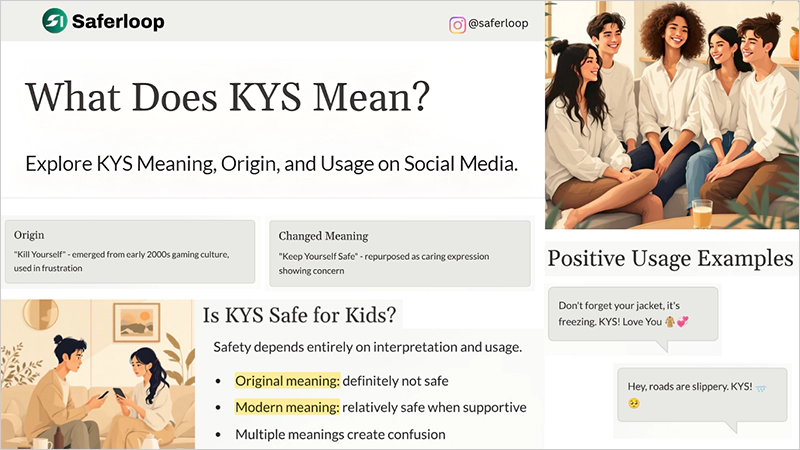
KYS is an internet acronym with diverse meanings in teen slangs. The initial meaning of KYS is ‘Kill Yourself,’ which was used for online gaming.
Currently, this term is repurposed as ‘Keep Yourself Safe’ and is popularly used for showing concern towards someone. Though this version is less popular, many online communities have accepted the positive KYS meaning.
Some of the usage examples of KYS slang are
- Hey, I know you have to go to the office in the rain. Roads are quite slippery, so KYS.
- Don’t forget your jacket, it’s freezing here. KYS! Love You
- You’re walking home alone, KYS! Call me if anything happens.
Where Did This Acronym Come From?
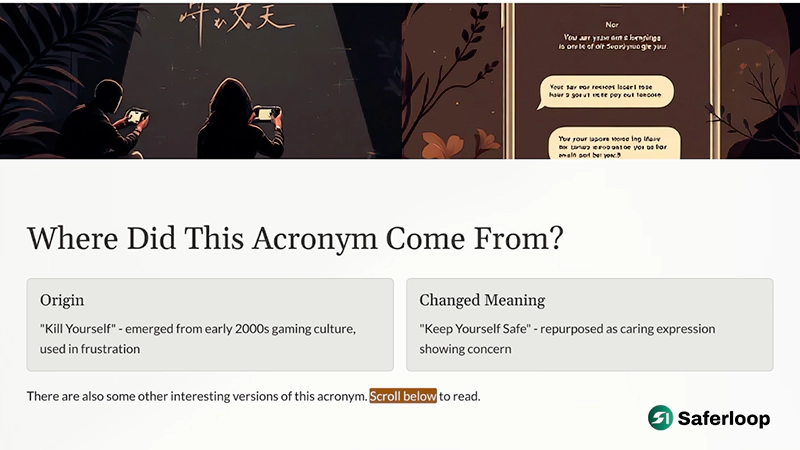
The acronym KYS originally emerged in the early 2000s from the early online gaming culture and was referred to as a shorthand for “kill yourself.” It is not possible to date its exact origin, but yes, there’s no doubt that this expression originated purely out of frustration and irritation.
However, over time, the KYS meaning changed drastically and shaped a positive tone of ‘Keep Yourself Safe.’ There are also some other interesting versions of this acronym that I have discussed below in great detail.
But before hopping to that, let’s quickly take a look at the dramatic evolution of this phrase and see how it acquired a completely opposite meaning that showcases affection and concern.
Also Read: What is Parental Advisory? Detent an Explicit Content So It Doesn’t Harm Kids
How Did the KYS Term Evolve Over Time?
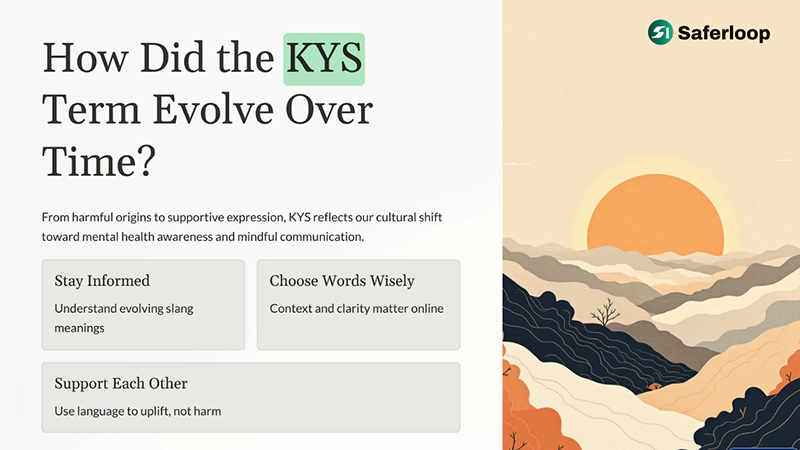
Starting off with a dark and harmful meaning, the KYS meaning has slowly shifted to be a supportive and positive acronym. Its initial version contributed to cyberbullying and emotional harm.
As the conversation and concerns about mental health took the limelight, the people moderated the KYS expression, reclaiming a more positive twist.
In 2025, the meaning of KYS in text stands for ‘Keep Yourself Safe,’ which reflects the broader cultural evolution of this acronym towards supportive communication.
Other Meanings of KYS
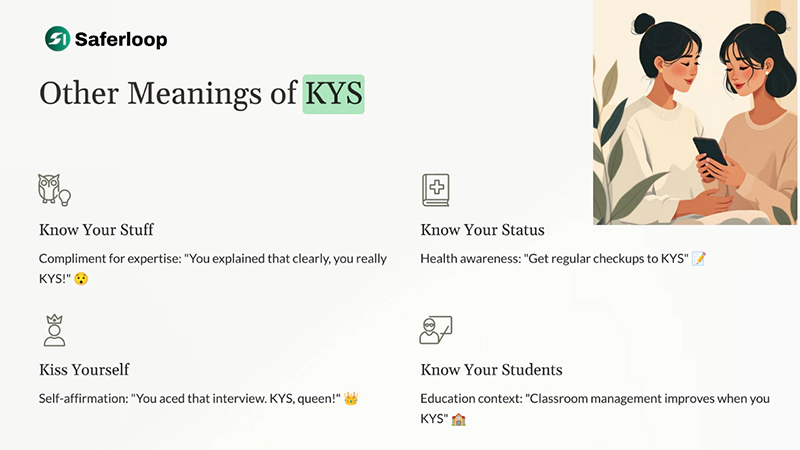
KYS is a diverse acronym with different meanings online. The exact meaning of this term depends on the context in which it is said. Here are a few alternative meanings of KYS!
- Know Your Stuff: It is a compliment for someone knowledgeable, skilled in a particular activity, and holding a strong understanding of subject matter:
- Wow! You explained that so clearly, you really KYS.
- You didn’t look at notes and still got it right. Damn you KYS!!
- Know Your Status: This phrase is mostly used in the medical industry and awareness-raising campaigns. It simply means find out your condition or state of being.
- Get regular checkups to add KYS to the list.
- You need to get tested for KYS. It’s high time you take control of your health.
- Kiss Yourself: This is a lighthearted yet confident remark. It is usually referred to as the act of self-affirmation, rather than a literal physical act.
- You aced that interview, girl. KYS, queen.
- You pulled off that outfit really well. KYS, totally slayed.
- Know Your Students: Particularly used in the field of education. It is mostly used by educators to refer to their students, signifying that the teachers know their students’ understanding.
- Before planning your curriculum, it’s important to KYS.
- Classroom management improves when you KYS
Also Read: Learn How to Block Websites on Chrome | A Smart Parenting Guide
Is KYS a Safe Expression for Kids to Use?
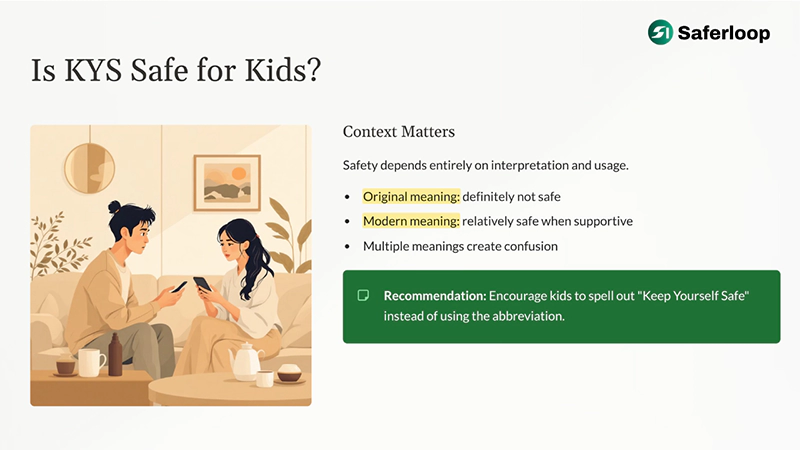
KYS has diverse meanings, so its safety concern totally depends on the context in which it is said. Hence, it cannot be perceived as a safe term, as it has both positive and negative interpretations.
Initially, it was perceived as “kill yourself.” Well, in this sense, it is definitely not a safe term for kids.
However, in 2025, the term KYS meaning in text, is popularly perceived as “Keep Yourself Safe,” which is a thoughtful message for showing care and concern.
When used in this sense or the above-mentioned contexts, this phrase is relatively safe for the kids.
Since it’s tricky slang, I suggest you not use it in front of infants, as the multiple meanings can lead to misunderstanding or raise serious concerns.
In case your child wants to say something supportive like ‘keep yourself safe,’ encourage them to spell it out instead of using the abbreviation KYS.
What Can Parents Do to Promote Mindful Use of KYS Slang Among Kids?
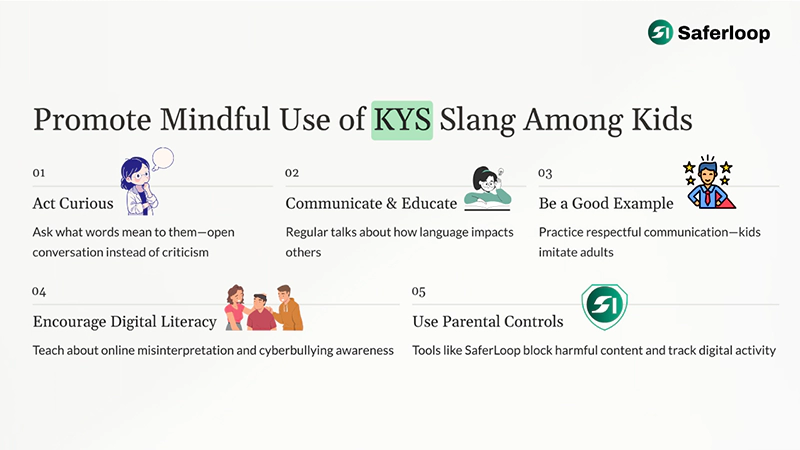
Kids usually pick up catchy phrases and slang from the internet without having the real knowledge of their meaning. But not all acronyms are straightforward, as some have diverse interpretations, like the meaning of KYS.
Hence, here are a few practical tips tested by me to encourage more mindful use of language in youngsters.
- Act Curious: Don’t be helicopter parents; instead of scolding or criticizing, ask the teen what does that word means to them. Curiosity will open the door for an open conversation where you can educate your child.
- Communicate and Educate: Have regular and open conversations with your minor about how language impacts others. Encourage them to use words thoughtfully.
- Be a Good Example: Young minds of the little fellows learn from the adults. Children often imitate the way parents speak, so practice respectful and intentional communication and avoid using harmful lingo.
- Encourage Digital Literacy: Teach the teenagers about the stuff they can say online and what they can’t. Make them understand how certain terms are misinterpreted online. Educate them about cyberbullying and ask them to seek help if they become victims of it.
- Get Parental Control Software: Parental Control Apps like SaferLoop will help your child use the internet mindfully. It will block the harmful language, inappropriate content, sites, and applications from your kid’s device. Furthermore, it will assist you in keeping track of the digital trails of your little fellow and give you instant alerts in case of cyberbullying or a digital attack.
Also Read: What Does Big Back Mean? Explore the Big Back Meaning, Its Origin, and Usage in the Modern World
Wrapping Up!
Internet lingo is quite complex, with the same word having multiple expressions, and parents can find it really hard to keep up with the diverse meanings of modern-day slang terms.
But don’t worry, this detailed KYS meaning guide will help you easily interpret the Gen Z language. Remember that it’s a contextual slang term, so the context and intent behind using this expression really matter.
I suggest you educate your child about mindful usage of such tricky slang and, most importantly, make them aware of the impact their words hold on others.
Frequently Asked Questions
Q: What does KYS stand for in TikTok?
Q: What does KYS mean in business?
Ans: In business, the expression KYS stands for ‘Know Your Supplier.’ It is generally used as a safety measure for risk prevention and compliance that companies usually undergo in order to verify the identity, reliability, and integrity of the suppliers they are dealing with.
Q: What is the difference between KYC and KYS?
Ans: In terms of business, KYC stands for ‘Know Your Customer,’ and KYS refers to ‘Know Your Supplier.’ They both serve the same goal of verifying the identity of the third party to prevent the acts of money laundering or other financial frauds.
